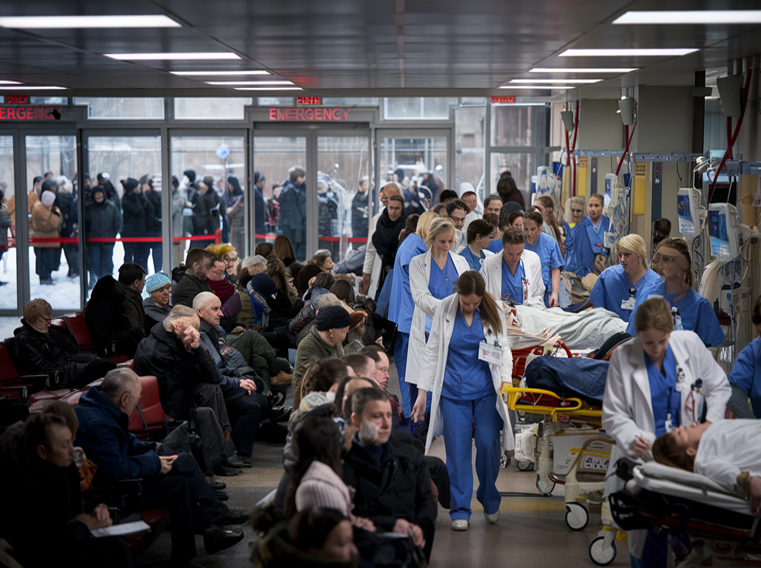From artisanal crepes to rebellious cheesecake waffles, Reading's breakfast rebels are transforming morning meals. These seven spots will revolutionize how you start your day.
Frimley Health NHS Foundation Trust has sounded the alarm as its Accident and Emergency departments face unprecedented strain. Healthcare professionals are imploring the public to reconsider visits to A&E unless absolutely necessary, as the trust grapples with what it describes as 'extreme pressures'. This urgent plea comes amidst a wider NHS crisis, with emergency services across the UK struggling to cope with increased demand. The situation at Frimley Health highlights the delicate balance between providing critical care and managing limited resources, raising questions about the long-term sustainability of emergency healthcare provision in the region.
A&E Departments Under Extreme Strain

Frimley Health NHS Foundation Trust is grappling with an unprecedented crisis in its Accident and Emergency departments. The trust, which operates three hospitals in Berkshire, Surrey, and Hampshire, has issued an urgent appeal to the public, asking them to reconsider visiting A&E unless absolutely necessary. This plea comes as the trust faces what it describes as "extreme pressures" on its emergency services.
The situation at Frimley Health is particularly dire, with all three of its main hospitals—Frimley Park Hospital, Wexham Park Hospital, and Heatherwood Hospital—experiencing severe strain on their A&E capacities. Sources within the trust indicate that wait times have increased dramatically, with some patients reporting waits of over 12 hours for non-life-threatening conditions.
Dr. Sarah Thompson, Chief Medical Officer at Frimley Health, stated, "We are currently facing an extraordinary influx of patients, which is stretching our resources to the limit. We urge the public to use alternative services such as NHS 111, local GPs, or pharmacies for non-emergency issues."
The trust has implemented several measures to manage the crisis, including redeploying staff from other departments to support A&E and cancelling non-urgent elective procedures. Despite these efforts, the pressure on emergency services remains critical.
Wider Implications and Community Impact
The crisis at Frimley Health is not an isolated incident but rather a symptom of a broader issue facing the NHS. Across the UK, emergency departments are struggling with increased demand, staff shortages, and limited resources. This situation raises serious questions about the long-term sustainability of emergency healthcare provision in the region and nationwide.
Local community leaders have expressed concern about the potential impact on vulnerable residents. Councillor James Hartley of Slough Borough Council commented, "We're worried about elderly residents and those with chronic conditions who may hesitate to seek medical attention due to these warnings. It's a delicate balance between managing A&E pressures and ensuring people get the care they need."
The situation also highlights the need for improved community healthcare services. Dr. Emma Roberts, a local GP, suggests, "Investing in preventative care and community health services could significantly reduce the burden on A&E departments. We need a more holistic approach to healthcare that addresses issues before they become emergencies."
As the crisis continues, there are calls for urgent government intervention. Health policy experts argue that without significant investment in NHS resources and staff, such pressures will become increasingly common, potentially leading to a breakdown in emergency care provision. The coming weeks will be crucial in determining how Frimley Health and the wider NHS navigate this challenging period.
A Call for Collective Action: Navigating the A&E Crisis
The dire situation at Frimley Health NHS Foundation Trust serves as a stark reminder of the mounting pressures facing emergency healthcare services across the UK. As A&E departments buckle under the strain of overwhelming demand, this crisis presents both challenges and opportunities for reimagining healthcare delivery.
The immediate risks are clear: prolonged wait times, potential compromises in care quality, and increased stress on healthcare workers. However, this crisis also opens doors for innovative solutions. There's an opportunity to bolster community-based healthcare initiatives, invest in preventative care programmes, and leverage technology to streamline patient triage and treatment.
For the local community, this situation underscores the importance of health literacy and responsible use of emergency services. It also highlights the need for stronger support networks to assist vulnerable populations in accessing appropriate care.
The path forward requires a multifaceted approach involving government intervention, community engagement, and individual responsibility. As we navigate this challenging landscape, we must ask ourselves: How can each of us contribute to easing the burden on our emergency services? Whether it's through supporting local health initiatives, advocating for increased NHS funding, or simply making informed decisions about our healthcare needs, every action counts.
The A&E crisis at Frimley Health is not just a local issue—it's a call to action for us all to play our part in shaping a more resilient and responsive healthcare system for the future.